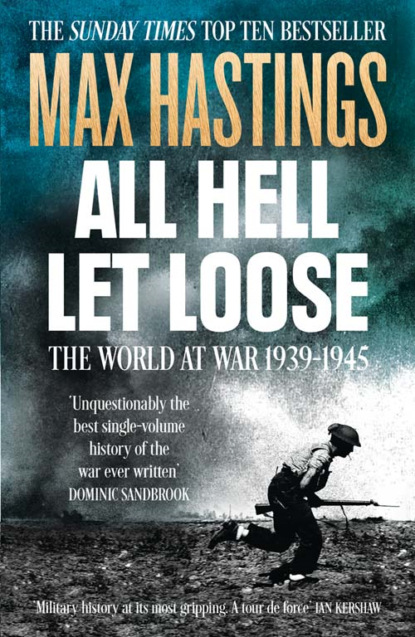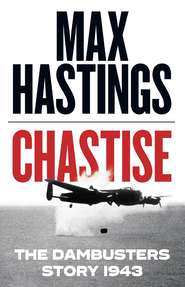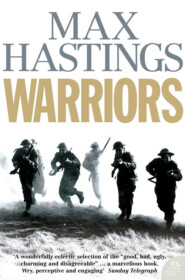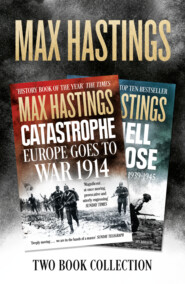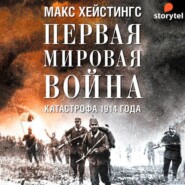По всем вопросам обращайтесь на: info@litportal.ru
(©) 2003-2024.
✖
All Hell Let Loose: The World at War 1939-1945
Настройки чтения
Размер шрифта
Высота строк
Поля
Hitler hoped that Stalin’s intervention would provoke the Allies to declare war on the Russians, and in London there was indeed a brief flurry of debate about whether Britain’s commitment to Poland demanded engagement of a new enemy. In the War Cabinet, only Churchill and war minister Leslie Hore-Belisha urged preparations for such an eventuality. Britain’s Moscow ambassador Sir William Seeds cabled: ‘I do not see what advantage war with the Soviet Union would be to us although it would please me personally to declare it on Molotov.’ Much to the relief of prime minister Neville Chamberlain, the Foreign Office advised that the government’s guarantee to Poland covered only German aggression. Bitter British rhetoric was unleashed against Stalin, but no further consideration was given to fighting him; the French likewise confined themselves to expressions of disgust. Within days, at a cost of only 4,000 casualties, the Russians overran 77,000 square miles of territory including the cities of Lwów and Wilno. Stalin gained suzerainty over five million Poles, 4.5 million ethnic Ukrainians, one million Belorussians and one million Jews.
In Warsaw, starving people still clung to hopes of aid from the west. An air-raid warden confided to an acquaintance: ‘You know the British. They are slow in making up their minds, but now they are definitely coming.’ Millions of Poles were at first bewildered, then increasingly outraged, by the passivity of these supposed friends. A cavalry officer wrote: ‘What was happening in the west, we wondered, and when would the French and British start their offensive? We could not understand why our allies were so slow in coming to our assistance.’ On 20 September, Poland’s London ambassador broadcast to his people at home: ‘Fellow countrymen! Know that your sacrifice is not in vain, and that its meaning and eloquence are felt to the utmost here…Already the hosts of our allies are assembling…The day will come when the victorious standards…shall return from foreign lands to Poland.’ Yet even as he spoke, Count Raczy
ski was conscious, as he wrote later, that his words were ‘little more than a poetic fiction. Where were the Allied hosts?’
In Paris, Polish ambassador Juliusz Łukasiewicz exchanged bitter words with French foreign minister Georges Bonnet. ‘It isn’t right! You know it isn’t right!’ he said. ‘A treaty is a treaty and must be respected! Do you realise that every hour you delay the attack on Germany means…death to thousands of Polish men, women and children?’ Bonnet shrugged: ‘Do you then want the women and children of Paris to be massacred?’ American correspondent Janet Flanner wrote from Paris: ‘It would seem, indeed, as if efforts are still being made to hold the war up, prevent its starting in earnest – efforts made, perhaps self-consciously, by government leaders reluctant to go down in history as having ordered the first inflaming shots, or efforts made as a general reflection of the various populations’ courageous but confused states of mind. Certainly this must be the first war that millions of people on both sides continued to think could be avoided even after it had officially been declared.’
The Polish Campaign (#ulink_7d229f3a-ea40-5e5f-8fee-a9e9af0be229)
The French were wholly unwilling to launch a major offensive against the Siegfried Line, as Winston Churchill urged, far less to invite German retaliation by bombing Germany. The British government similarly declined to order the RAF to attack German land targets. Tory MP Leo Amery wrote contemptuously of prime minister Neville Chamberlain: ‘Loathing war passionately, he was determined to wage as little of it as possible.’ The Times editorialised in a fashion which seemed to Polish readers to mock their plight: ‘In the agony of their martyred land, the Poles will perhaps in some degree be consoled by the knowledge that they have the sympathy, and indeed the reverence, not only of their allies in western Europe but of all civilized people throughout the globe.’
It is sometimes argued that in mid-September 1939, with the bulk of the German army committed in Poland, the Allies had an ideal opportunity to launch an offensive on the Western Front. But France was even less prepared psychologically than militarily for such an initiative; and Britain’s small expeditionary force, still in transit to the Continent, could contribute little. The Germans could probably have repelled any assault without much disrupting their operations in the east, and the inertia of the French and British governments reflected the will of their peoples. A Glasgow secretary named Pam Ashford wrote in her diary on 7 September: ‘Practically everyone thinks the war will be over in three months…Many hold that when Poland is smashed up there won’t be much point in continuing.’
The Poles should have anticipated the passivity of their allies, but its cynicism was breathtaking. A modern historian, Andrzej Suchcitz, has written: ‘The Polish government and military authorities had been double-crossed and betrayed by their western allies. There was no intention of giving Poland any effective military support.’ As Warsaw faced its doom, Stefan Starzy
ski declared in a broadcast: ‘Destiny has committed to us the duty of defending Poland’s honour.’ A Polish poet later celebrated the mayor’s defiance in characteristically emotional terms:
And he, when the city was just a raw, red mass
Said: ‘I do not surrender.’ Let the houses burn!
Let my proud achievements be bombed into dust.
So what, if a graveyard grows from my dreams?
For you, who may come here, some day recall
That some things are dearer than the finest city wall.
By the end of the campaign’s third week, Polish resistance was broken. The capital remained unoccupied only because the Germans wished to destroy it before claiming the ruins; hour after hour and day after day, merciless bombardment continued. A nurse, Jadwiga Sosnkowska, described scenes at her hospital outside Warsaw on 25 September:
The procession of wounded from the city was an unending march of death. The lights went out, and all of us, doctors and nurses, had to move about with candles in our hands. As both the operating theatres and the dressing stations were destroyed the work was done in the lecture rooms on ordinary deal tables, and owing to the lack of water the instruments could not be sterilised, but had to be cleansed with alcohol…As human wreckage was laid on the table the surgeon vainly attempted to save the lives that were slipping through his hands…Tragedy followed tragedy. At one time the victim was a girl of sixteen. She had a glorious mop of golden hair, her face was delicate as a flower, and her lovely sapphire-blue eyes were full of tears. Both her legs, up to the knees, were a mass of bleeding pulp, in which it was impossible to distinguish bone from flesh; both had to be amputated above the knee. Before the surgeon began I bent over this innocent child to kiss her pallid brow, to lay my helpless hand on her golden head. She died quietly in the course of the morning, like a flower plucked by a merciless hand.
Professional soldiers can seldom afford to indulge in emotionalism about the horrors of war, but posterity must recoil from the complacency of Germany’s generals about both the character of their national leader, and the murderous adventure in which they had become his accomplices. Gen. Erich von Manstein is widely regarded as the finest German general of the war; afterwards, he took pride in pretensions to have done his part as an officer and gentleman. However, his writings during the Polish campaign, as well as later, reveal the insensitivity characteristic of his caste. He was delighted by the invasion: ‘It’s a grand decision of the Führer in view of the attitude of the Western Powers up till now. His offer to solve the Polish question was so obliging that England and France – if they really wanted peace – should have pushed Poland into accepting.’ Soon after the campaign began, Manstein visited a formation which he himself had recently commanded: ‘It was touching to see the staff so pleased when I suddenly appeared…Cranz [his successor] told me it was a pleasure to command such a well-trained division in war.’
In a letter to his wife, Manstein described his personal routine during the campaign, in which he served as von Rundstedt’s chief of staff at Army Group South: ‘I get up at 6.30, plunge into the water [for a swim], into the office by 7.00. Morning reports, coffee, then work or trips with R[undstedt]. Midday, field kitchens here. Then half an hour break. In the evening after supper, which we eat together with the general staff officers as at lunch, the evening reports come in. And so it goes on to 11.30.’ The contrast is stark, between the serenity of army headquarters and the vast human tragedy its operations had precipitated. Manstein signed an order for the German forces encircling Warsaw to fire upon any refugees who attempted to leave: it was deemed easier to force a swift outcome of the campaign, and to avoid a battle in the streets, if the inhabitants were unable to escape the capital’s bombardment. Yet he was a man of such personal fastidiousness that he sometimes quit rooms in which von Rundstedt was speaking, because he recoiled from his chief’s obscene language. On 25 September, he basked in a congratulatory visit from Hitler, writing to his wife: ‘It was nice to see how the soldiers rejoiced everywhere as the Führer drove past.’ In 1939, the officer corps of the Wehrmacht already displayed the moral bankruptcy that would characterise its conduct until 1945.
A Polish cavalry officer, Klemens Rudnicki, described the plight of his regiment and its beloved mounts in Warsaw on 27 September, the last night before the city fell: ‘Red, glittering flames illuminated our horses, standing quiet and motionless along the walls of the Łazienki Park, resembling saddled skeletons. A few were dead; some were bleeding, exposing huge, gaping wounds. Kowalski’s horse Cenzor was still alive, but lay with his bowels ripped out. Not long ago he had won the Army’s Challenge Cup at Tarnopol. He had been our pride. A shot in the ear ended his sufferings. Next day, probably, somebody needing to assuage his hunger would cut a joint from his loins.’
Warsaw capitulated on 28 September. Little Captain Krysk of Rudnicki’s 3rd squadron declared emotionally that he rejected the order: ‘Tomorrow morning we shall charge the Germans to preserve the regimental tradition that the 9th Lancers never surrender.’ Rudnicki dissuaded him; together, the regiment’s officers secreted their colours in the church of St Anthony on Senatorska Street, the only building still intact amid acres of rubble. Rudnicki reflected ruefully that the Polish army should have deployed in depth for a protracted defensive action, instead of manning a weak forward line that was certain to be broken. This, however, would have been ‘at variance with our natural aspiration – and with our military traditions and hopes of becoming a great Power’.
On 29 September the Modlin army north of Warsaw surrendered to the Germans, who took 30,000 prisoners. Organised resistance petered out, the Hel peninsula falling on 1 October; the last recorded engagement took place at Kock, north of Lublin, on the 5th. Hundreds of thousands of men fell into German hands, while many more struggled to flee. Young flier B.J. Solak was moved to encounter an air force colonel sitting beneath a tree, tears pouring down his face. Feliks Lachman was one of many Poles whose thoughts reverted to their recent reading of Gone with the Wind. Fleeing his home, he mused: ‘Desolate as was the Tara estate, Scarlett O’Hara was going through fire and water to the place where she knew she belonged. We had left, once and forever, men and things that formed the social, intellectual and emotional environment of our life. We were moving in a vacuum, aimlessly.’ After an air raid on the city of Krzemieniec, Adam Kruczkiewicz saw in the street a hysterical old Jew, ‘standing over the corpse of his wife…uttering a string of curses and blasphemies, shouting “There is no God! Hitler and the bombs are the only gods! There is no grace and pity in the world!”’
A few Polish cavalry units made good their escape into Hungary, where they surrendered their arms. At the barracks of the 3rd Hungarian Hussar Regiment, exhausted fugitives were moved to find themselves greeted by the unit’s officers, led by the elderly Colonel von Pongratsch, drawn up in full ceremonial uniform. A few days later, when the Poles left to face internment, the bewhiskered veteran embraced each one before bidding them farewell. Such old-world courtesies were welcome, because they had been banished from the pitiless universe of which most Poles now found themselves inhabitants.
Gen. Władysław Anders led his exhausted and depleted unit eastwards to escape the Germans. The men sang as they urged on their emaciated horses amid a throng of refugees and military stragglers. Then they met the Red Army, and Anders sent a liaison officer to the local Soviet headquarters to beg safe passage to the Hungarian border. The Pole was stripped of all he had, and threatened with execution. Russian guns began to shell the Polish positions. Anders ordered his men to split into small groups and find their own way into Hungary. He himself, badly wounded, was captured along with many others. A Russian officer told him complacently: ‘We are now good friends of the Germans. Together we will fight international capitalism. Poland was the tool of England, and she had to perish for that.’
Regina Lempicka was one of hundreds of thousands of Poles arbitrarily arrested by the Russians during the months that followed, then shipped to Kazakhstan. Her grandmother and baby niece died of starvation during their exile, while her soldier brother was shot. The family experience in Russian hands, she wrote later, became ‘a ghastly dream’. As one group of Polish soldiers was marched over a border bridge by Red Army guards, a prisoner said bleakly: ‘We enter Russia. We shall never return.’ Tadeusz
ukowski wrote: ‘From this instant the whole world seemed to change: different sky, soil and people. A weird feeling, as if something cracked inside you had burst open, as if life left you and you suddenly dropped into a dark cave, a pitch-dark underground passage.’ A woman said contemptuously to a Polish prisoner on his way to the gulag, ‘You Polish, fascist lords! Here in Russia you will learn how to work. Here you will be strong enough to work but too weak to oppress the poor!’
Around 1.5 million Poles, mostly civilians evicted from their homes in the forfeited east of their country during the months that followed, began an ordeal of captivity and starvation in Soviet hands, which cost the lives of some 350,000. Many such families were without menfolk, because these had been summarily dispatched. On 5 March 1940, the Soviet Union’s security chief Lavrenti Beria sent a four-page memorandum to Stalin, proposing the elimination of Polish senior officers and others defined as leaders of their society. Those held in Soviet camps, urged Beria, should be subjected to ‘the use of the highest means of punishment – death by shooting’. Stalin and other members of the Politburo formally approved the recommendation to decapitate Poland. During the weeks that followed, at least 25,000 Poles were murdered by NKVD executioners at various Soviet prisons, each receiving a single bullet in the back of the head. The bodies were then buried in mass graves in the forests around Katyn west of Smolensk, at Minsk and other sites, the largest of which was discovered by the gleeful Nazis in 1943.
Later allegations that the post-1945 Allied war crimes trials represented ‘victors’ justice’ were powerfully reinforced by the fact that no Russian was ever indicted for Katyn. In October 1939 a Pole under interrogation by NKVD officers demanded bitterly: ‘How is it possible for the USSR, a progressive and democratic state, to be on friendly terms with a reactionary Nazi Germany?’ His inquisitor replied coldly: ‘You are wrong. Our policy is at present to be neutral during the struggle between England and Germany. Let them bleed – our power will increase. When they are utterly exhausted, we shall come out as the strong and fresh party, decisive during the last stage of the war.’ This seems a just representation of Stalin’s aspirations.
Hitler, visiting Warsaw on 5 October, gestured to the ruins and addressed accompanying foreign correspondents: ‘Gentlemen, you have seen for yourselves what criminal folly it was to try to defend this city…I only wish that certain statesmen in other countries who seem to want to turn all of Europe into a second Warsaw could have the opportunity to see, as you have, the real meaning of war.’ Warsaw’s Mayor Starzy
ski was removed to Dachau, where he was murdered four years later. The Polish army had lost 70,000 men killed and 140,000 wounded, together with uncounted thousands of civilian dead. The German army’s casualties amounted to 16,000 killed and 30,000 wounded. Some 700,000 Polish soldiers became Hitler’s prisoners. An unelected Polish exile government was established in London.
Britain’s Chief of the Imperial General Staff, Gen. Sir Edmund Ironside, met Adrian Carlton de Wiart on that officer’s return from Warsaw and snapped dismissively, ‘Well, your Poles haven’t done much.’ This assertion reflected the frustration of British and French hopes that the Polish army would inflict sufficient injury upon the Wehrmacht to alleviate the Western Allies’ need to do so. Carlton de Wiart replied, ‘Let us see what others will do, sir.’ A remarkable number of Poles made the decision to accept exile, separation from everything they knew and loved, in order to continue the fight against Hitler. Some 150,000 made their way westwards, often after memorable odysseys. This was by far the largest voluntary exodus from any of the nations eventually overrun by Germany, and reflected the Poles’ passion to sustain their struggle. Exiles fleeing west were astonished by the warm reception they received in fascist Italy, where a host of people called to them, ‘Bravo Polonia!’
Before quitting his home airfield, fighter instructor Witold Urbanowicz gave a radio and his silk shirts to the woman cleaner of his quarters, his formal evening dress to the porter, then set off by bus with his cadets, down the road to Romania; almost a year later, at the controls of a Hurricane, he became one of the RAF’s foremost aces. Some 30,000 Poles, one-third of them air force pilots and ground crew, reached Britain in 1940, and more came later. One man clutched a wooden propeller, a symbol to which he had clung doggedly through a journey of 3,000 miles. Many others joined the British Army in the Middle East, after their belated release from Stalinist captivity. These men would make a far more notable contribution to the Allied war effort than had Britain to their own.
Poland became the only nation occupied by Hitler in which there was no collaboration between the conquerors and the conquered. The Nazis henceforth classified Poles as slaves, and received in return implacable hatred. As Princess Paul Sapieha crossed the frontier to precarious safety amid a throng of refugees, her small daughter asked, ‘Will there be bombs in Romania?’ The princess answered, ‘No more bombs now. There’s no war here. We’re going where it will be sunny and where children can play wherever they please.’ The child persisted: ‘But when are we going home to Papa?’ Her mother could not answer. Soon, there would be scarcely a corner of Europe that offered safe haven to either children or adults.
Hitler had committed himself to conquer Poland, but as so often, he had no clear plan for what should follow. Only when it became plain that Stalin welcomed the country’s extinction did Germany’s ruler decide to annex western Poland. Before the war, Nazis liked to dismiss Poland as a ‘Saisonstaat’ – a temporary state. Now, it would cease to be any state at all: Hitler became master of lands containing fifteen million Poles, two million Jews, one million ethnic Germans and two million other minorities. Among his foremost characteristics was a reflexive hatred of all those who opposed his will. This soon manifested itself against the Poles – and especially, of course, against their Jews. One day in Łód
soon after the occupation began, Szmulek Goldberg was returning from work when ‘I encountered chaos in the streets. People were running wildly in every direction. Somebody stopped and grabbed my sleeve. “Hide! Hide!” he shrieked. “The Germans are capturing Jews at gunpoint and taking them away on trucks.”’ He watched trucks drive past, loaded with captives, a first earnest of Hitler’s designs upon his race. Within weeks of Poland’s conquest, the first few thousand of its Jewish citizens had been murdered.
In Britain, a mother named Tilly Rice who had been evacuated with her children from London to a fishing port in north Cornwall, wrote on 7 October after the end of the Polish campaign: ‘In the household in which I live the whole thing has been received in bewildered silence…War is still going on, but as something distant with just occasional repercussions on the general lives of the community…My own reactions to the whole situation are growing more and more indifferent every day.’ Britain and France had declared war on Germany to save Poland. Poland was now gone, and Polish representatives were expelled from the Allied Supreme War Council, where they were deemed redundant. Many British and French politicians and citizens demanded: to what end was the war being sustained? How could it be effectively waged? US ambassador in London Joseph Kennedy shrugged to his Polish counterpart: ‘Where on earth can the Allies fight the Germans and beat them?’ Though Kennedy was a shameless anglophobe, appeaser and defeatist, his question was valid, and the Allied governments had no good answer to it. After the fall of Poland, the world waited in bewilderment to discover what might follow. Since France and Britain lacked stomach to seize the initiative, the further course of the war waited upon the pleasure of Adolf Hitler.
2
No Peace, Little War
In November 1939, the Norwegian Nobel Committee announced that, with much of Europe at war, it had decided to award no Peace Prize that year. Yet in the eyes of many British and French people, the collapse of Poland condemned to futility the struggle to which their governments had committed them. The French army, with a small British contingent in its traditional place on the left flank, confronted German forces on France’s eastern frontier. But the Allies had no appetite for offensive operations, certainly not until they were better armed. The Polish campaign had demonstrated the effectiveness of the Wehrmacht and Luftwaffe, though not yet their full power. Gen. Lord Gort, commanding the British Expeditionary Force, was appalled by the condition of some Territorial units which arrived in October to join his own five poorly equipped divisions. He said he had not believed it possible to see such a sight in the British Army: ‘The men had no knives and forks and mugs.’
Allied deployments were critically hampered by Belgian neutrality. It was assumed that if Hitler attacked in the west, he would reprise Germany’s 1914 strategy, advancing through Belgium, but King Leopold declined to offer Germany a pretext for invasion by admitting Anglo-French troops meanwhile. In consequence, the armies on the Allied left wing spent much of the icy winter of 1939 building defences on the French border which they intended to abandon, in favour of an advance into Belgium the moment the Germans attacked. The British, having only belatedly introduced conscription, possessed no large reserves of trained manpower for mobilisation, to match those of almost every Continental nation. Britain’s anti-militarist tradition was a source of pride to its people, but in consequence the nation declared war on the strongest power in Europe while capable of contributing only limited ground and air reinforcements to the French armies deployed against Germany. Any land initiative was dependent on the will of the Paris government. France had begun to rearm before Britain, but still awaited delivery of large orders of tanks and aircraft. The Allies were too weak either to precipitate a showdown with the Wehrmacht or to mount an effective air assault on Germany, even if they had the will for one. During the winter of 1939 the RAF staged only desultory daylight bomber attacks on German warships at sea, with heavy losses and no useful results.
Common sense should have told the Allied governments that Hitler was unlikely to delay a clash of arms in the west until they were adequately equipped to challenge him. Instead, perversely, they persuaded themselves that time was on their side. They sought to exploit their naval strength to enforce a blockade of the Reich. Gamelin spoke of launching a big land offensive in 1941 or 1942. The two governments clung to hopes that the German army and people would meanwhile ‘come to their senses’ and acknowledge that they could not sustain a protracted struggle. In Poland, so the Allies’ Panglossian thinking went, Hitler’s reckless territorial aggrandisement had achieved its last triumph: the Nazis would be overthrown by sensible Germans, then an accommodation could be sought with a successor regime.
The Allies formalised their joint decision-making through a Supreme War Council, of the kind that was established only in the final year of the previous European conflict. It was agreed that the British and French would share the cost of the war effort sixty-forty, proportions reflecting the relative size of their economies. France’s politics and policies were profoundly influenced by fear of the left, prospective tools of Stalin. In October 1939, thirty-five communist parliamentary deputies were detained in the interests of national security. The following March, twenty-seven of these were tried and most convicted, receiving prison sentences of up to five years. In addition, some 3,400 communist activists were arrested, and more than 3,000 foreign communist refugees interned.
Among the Allies’ mistakes in forging their strategy, insofar as they had one, was to focus upon strengthening their armed forces while conceding little attention to morale; ministers ignored the corrosive influence of inactivity on public sentiment. In the minds of many French and British people, the war effort seemed purposeless: their nations were committed to fight, yet were not fighting. The French were acutely sensitive to the economic strain imposed by sustaining 2.7 million men under arms. They urged on the British the virtues of action almost anywhere save on the Western Front. Mindful of France’s 1.3 million World War I dead, they recoiled from provoking another bloodbath on their own territory. But their proposals for marginal operations – for instance a Balkan front in Salonika, to pre-empt German aggression there – found no favour in London. The British feared such a step would merely provoke the Italians to make common cause with Germany. Ministers would not even speak publicly of creating an ‘anti-fascist front’, for fear of upsetting Benito Mussolini.
Unable to define credible military objectives, many British and French politicians craved a patched-up peace with Hitler, granted only that he should accept some face-saving moderation of his territorial ambitions; their peoples recognised this, coining the phrases ‘Phoney War’ and ‘Bore War’. The social-research organisation Mass Observation reported ‘a strong feeling in the country that the wretched war is not worth going on with…We can suspect that Hitler has won News-Round 1 in this war. He’s been able to give his own people a tremendous success story – Poland.’
It is hard to overstate the impact of months of passivity upon the spirit of France’s forces. In November 1939 British corps commander Alan Brooke described his sensations on witnessing a parade of the French Ninth Army: ‘Seldom have I seen anything more slovenly…men unshaven, horses ungroomed, complete lack of pride in themselves or their units. What shook me most, however, was the look in the men’s faces, disgruntled and insubordinate looks…I could not help wondering whether the French are still a firm enough nation to again take their part in seeing this war through.’ Exiled Poles, of whom some thousands were now attached to the French forces, noted with dismay the equivocal attitudes displayed by their allies: pilot Franciszek Kornicki wrote that ‘both the French communists and fascists worked against us, and Lyons was full of the former. One day somebody made a friendly gesture, but another day someone else would swear at you.’
A French soldier, the writer Jean-Paul Sartre, wrote in his diary on 26 November: ‘All the men…were raring to go at the outset, but now they are dying of boredom.’ Another soldier, Georges Sadoul, wrote on 13 December: ‘The days pass, interminable and empty, without the slightest occupation…The officers, mainly reservists, think no differently from the men…One feels they are weary of the war, they say and repeat that they would like to go home.’ On 20 February 1940, Sartre observed: ‘The war machine is running in neutral…Only yesterday a sergeant was telling me, with a gleam of insane hope in his eyes: “What I think is, it’ll all be arranged, England will climb down.”’
The British were equally baffled. Jack Classon, a young shopworker in Everton, Lancashire, wrote to a friend in the army: ‘The war doesn’t seem to make much headway, does it? We read one thing in the paper in the morning, the denial the following day, & it’s killing business. You can blame my gloom on the black curtains that drape the shop & the blued windows that stare at you when you go upstairs…The Curzon cinema has had for the last week or so Henry Croudson the organist as guest…some people are enjoying that more than the picture, his most popular number at the moment being “We’ll Hang Out The Washing On The Siegfried Line”. The audience raises the roof when he plays that.’
One and a half million British women and children, evacuated from the cities amid the threat of German bombing, suffered agonies of homesickness in an unfamiliar rural environment. One of them, Derek Lambert, a nine-year-old from London’s Muswell Hill, later recalled: ‘We went to strange beds and lay with fists clenched. Our toes found tepid hot water bottles and our fingers silk bags of old lavender inside the pillows. An owl hooted, wings brushed the window. I remembered the London sounds of distant trains and motor cycles, the breaking limbs of the mountain ash, next door’s dog, the droning radio, the fifth stair groaning and the ten-thirty throat-clearing; I remembered the familiar wallpaper where you could paddle a canoe through green rapids or drive a train along sweeping cuttings…We sobbed in awful desolation.’
Most evacuees were drawn from the underclass, and shocked rustic hosts by their rags and anarchic habits: urban children, victims of the thirties Depression, were unaccustomed to meals at fixed hours, some even to knives and forks. They were used to subsisting on ‘pieces’ – bread and margarine, fish and chips – eaten on the move, together with tinned food and sweets. They recoiled from soup, puddings and all vegetables save potatoes. Many paraded their alienation by resorting to petty delinquency. The habits of their mothers dismayed staid rural communities: ‘The village people objected to the evacuees chiefly because of the dirtiness of their habits and clothes,’ recorded Muriel Green, a garage assistant in Snettisham, Norfolk. ‘Also because of their reputed drinking and bad language. It’s exceptional to hear women swear in this village or for them to enter a public house. The villagers used to watch them come out of the pubs with horror. The holiday camp proprietor said: “You should see them mop down the drink.”’ By Christmas, with Britain still unbombed, most of the evacuees had returned to their city homes, to the mutual relief of themselves and their rural hosts.
If there was little substance to Britain’s war effort, there were many symbols: sandbagged public buildings, barrage balloons floating above London, a rigorous blackout in the hours of darkness. Before peace came, accidents in the blackout killed more people than did the Luftwaffe: in the last four months of 1939 there were 4,133 deaths on the roads, 2,657 of these pedestrians, a figure almost double that for the same period in 1938. Many more people died as a consequence of non-highway mishaps: some 18 per cent of those interviewed by Princeton pollsters in December 1940 said they had injured themselves groping in the dark; three-quarters of respondents thought air-raid precautions should be eased. Defence regulations were so stringently enforced that two soldiers leaving the dock at the Old Bailey after being condemned to death for murder were rebuked for failing to pick up their gas masks. Two and a half million people were enrolled in civil defence.





